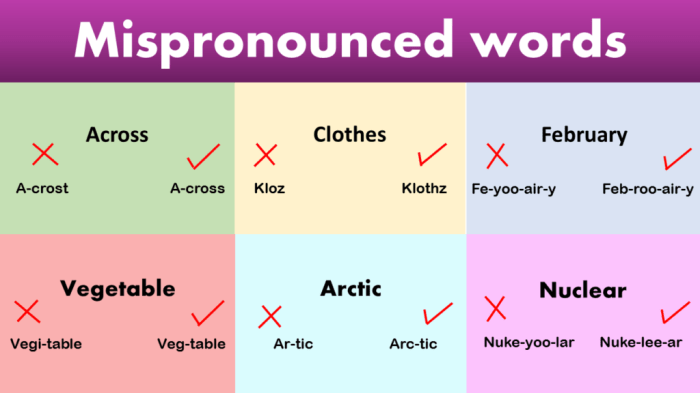No pronuncio bien algunas palabras practicar: Embark on a journey to enhance pronunciation skills, overcome challenges, and unlock the power of clear and confident communication.
Pronunciation plays a pivotal role in effective communication, shaping the way we convey our thoughts and connect with others. However, individuals often face difficulties with pronunciation, leading to misunderstandings and diminished confidence. This comprehensive guide delves into the significance of pronunciation, unveils effective techniques for improvement, and explores the myriad benefits of mastering this essential aspect of language.
1. Importance of Pronunciation

Pronunciation, the manner in which words are spoken, plays a pivotal role in effective communication. Accurate pronunciation ensures clear articulation, enabling listeners to comprehend messages effortlessly. Conversely, mispronunciation can lead to misunderstandings, impairing communication and potentially causing embarrassment or confusion.
Individuals with pronunciation difficulties face challenges in conveying their ideas and comprehending spoken language. These challenges may stem from various factors, including native language interference, auditory processing issues, or motor speech impairments. Mispronunciation can result in words being misinterpreted, leading to misunderstandings and communication breakdowns.
Examples of how mispronunciation can hinder communication include: confusing “their” and “there,” mispronouncing “subtle” as “suttle,” or uttering “nuclear” as “nucular.” Such errors can lead to misunderstandings, affecting comprehension and potentially causing embarrassment.
2. Techniques for Improving Pronunciation: No Pronuncio Bien Algunas Palabras Practicar

Improving pronunciation requires consistent practice and the implementation of effective techniques. One approach is to break down unfamiliar words into smaller units, focusing on individual sounds and syllables. This allows for focused practice and helps build familiarity with the pronunciation of specific phonemes.
Another strategy involves imitating native speakers. By listening attentively to the pronunciation of native speakers and attempting to replicate their speech patterns, individuals can enhance their own pronunciation accuracy. Resources such as online dictionaries with audio pronunciations and mobile apps that provide interactive pronunciation exercises can aid in this process.
3. Resources for Pronunciation Improvement
Numerous resources are available to assist individuals in improving their pronunciation. Online dictionaries provide audio pronunciations, allowing users to hear the correct pronunciation of words. Pronunciation guides offer detailed explanations of sound production and provide exercises to practice specific sounds.
Mobile apps have emerged as valuable tools for pronunciation practice. These apps often incorporate interactive exercises, games, and personalized feedback, making the learning process engaging and effective.
Speech therapy services can provide professional guidance and support for individuals with persistent pronunciation difficulties. Speech therapists assess individual needs and develop tailored programs to address specific pronunciation challenges.
4. Tips for Practicing Pronunciation
Regular practice is essential for improving pronunciation. Establishing a consistent practice routine, even for short periods, can significantly enhance progress. Repetition and consistency are key to developing muscle memory and reinforcing correct pronunciation habits.
Incorporating pronunciation practice into daily activities can also be beneficial. Reading aloud, listening to audiobooks, or engaging in conversations with native speakers provides opportunities to practice pronunciation in a natural context.
5. Benefits of Improved Pronunciation

Enhanced pronunciation brings numerous advantages. Clear and accurate pronunciation fosters confidence in communication, enabling individuals to express themselves effectively and be understood with ease. Improved pronunciation also enhances listening comprehension, as individuals can more readily recognize and interpret spoken words.
Professionally, individuals with strong pronunciation skills are perceived as more articulate and competent, leading to increased opportunities for success. In personal interactions, clear pronunciation facilitates effective communication, fostering stronger relationships and building rapport.
Key Questions Answered
How can I practice pronunciation effectively?
Regular practice is key. Break down unfamiliar words into smaller units, imitate native speakers, and utilize online resources and mobile apps.
What are the benefits of improving pronunciation?
Enhanced clarity, increased confidence, improved communication skills, and greater personal and professional success.